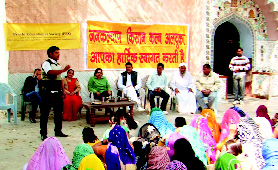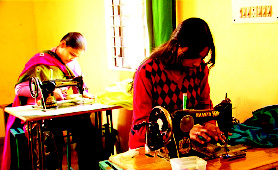

A resident of Mewat, Sabina (name changed) was in class eight when her parents asked her to leave studies. For over two years she sat at home, learning cooking and taking care of her siblings. She says, “Studying with boys is considered inappropriate in our village. Moreover, the prime responsibility of a girl is to manage the family and perform household chores – not to study.” Although she wanted to go back to school, there was nothing she could do about it. However, a ray of hope was shown by Prachi Educational Society (PES), an NGO, that took Sabina, along with her siblings and mother, to school. The NGO has brought many drop-outs back to school. It also imparts soft-skills to the mothers, to give them a sense of self-reliance.
This noble initiative was started some twenty years ago, when a professor of Delhi University, Dr. Rama Patnayak, visited a slum site near New Delhi Railway Station. Moved by the miserable condition of the women and children, she decided to devote the rest of her life for the welfare of such underprivileged. “Along with a few lecturers from the Delhi University, I started visiting the site regularly, and set up a temporary site near Sheila Theatre, where they were given food, shelter and education. That is when PES was born. One of our founding members, Ajay Kaushik, and the local community, helped a lot. Gradually, the NGO expanded operations to the other parts of the City,” says Dr. Rama.
A focus on suburbs and 'Old' Gurgaon
When Dr. Rama shifted to Gurgaon, she noticed that the condition of the poor women and children was even worse in Haryana. She started focussing on the areas of 'old' Gurgaon, and suburbs such as Mewat, Nuh and Sohna. Today, the NGO has identified over 450 women who need help, as also a number of government schools that have high dropout rates. The NGO provides healthy food, education, soft-skill training and health camps for the underprivileged women and children. “The level of awareness is higher in Delhi, and the urban part of Gurgaon. But if you go to a village located just 10 km away from the Cyber City, the conditions are pathetic. In fact even the old part of the City is still struggling to get its share of development,” says Dr. Rama.
“It is pity that today, when we talk about the right to education for all, some students of 12th standard in the government schools don’t even know how to write an application. Despite computer education having been made compulsory in all the government schools, the reality is that most of the students learn only about the theoretical part of a computer, and have never got an opportunity to operate it,” says Dr. Rama. With an aim to improve the education, PES has adopted a school in the City. Counselling is a must for all the children and their parents. “Children imbibe values from their parents. As most of the underprivileged children often see their parents fighting, they tend to become insensitive at a young age. That is why their chances of indulging in crimes and drug-abuse are higher. We try to ensure that these children are raised in happy and mature surroundings. Counselling the children and parents is the best way to do it,” says a volunteer.
In all the centres, the mothers of the students are given soft-skills training, personality development courses, and most importantly, civic education. PES also encourages students to take up sports. “Today, under-age sex is a big problem, even in the villages. One of the reasons is that children watch television most of the time, and don’t have any platform to release their energy. Encouraging sports is the best way to tackle such issues,” feels Dr. Rama. Recently, the NGO has formed Volleyball Clubs in many villages of Mewat, Nuh and Sohna.
Going forward
In spite of two decades of good work and support to the underprivileged, PES has been struggling to get space. “We have a couple of centres in 'Old' Gurgaon and Mewat; but as we are looking at expanding our operations, we find we don’t have enough space for our centres. I think the media can help a lot in helping us overcome such challenges,” says a volunteer. The NGO is looking for space in the DLF area, to open a training centre for underprivileged women – where they can learn skills such as tailoring and block painting.
Another major challenge is the mindset of men. Dr. Rama, who has been working closely with the men and women in the villages of Mewat, Sohna and Nuh, believes that “the mindset of a man decides the fate of the family. In certain communities, men don’t allow their daughters to even keep cell phones. They don’t understand that it is also a safety device. For them, it is a symbol of 'power', and a girl can never have it!” To ensure that this mindset changes in future, PES is focussing on imparting the 'right' education and values to young boys.
The NGO is also raising its voice against the rising crime against women in the City. “Many times I have witnessed girls being harassed by men on bikes, on the roadside. I want to form a pressure group in the City, that can raise its voice for women,” she says. At present Dr. Rama is working on a campaign to find an alternative to the 'shared autos'. She feels that they are a threat to poor women, who have no choice but to many times travel with drunken men.
Read More...